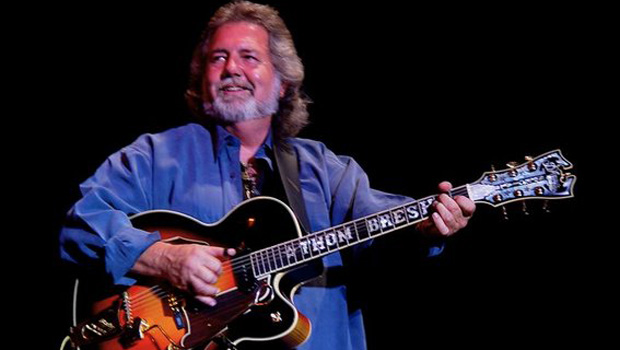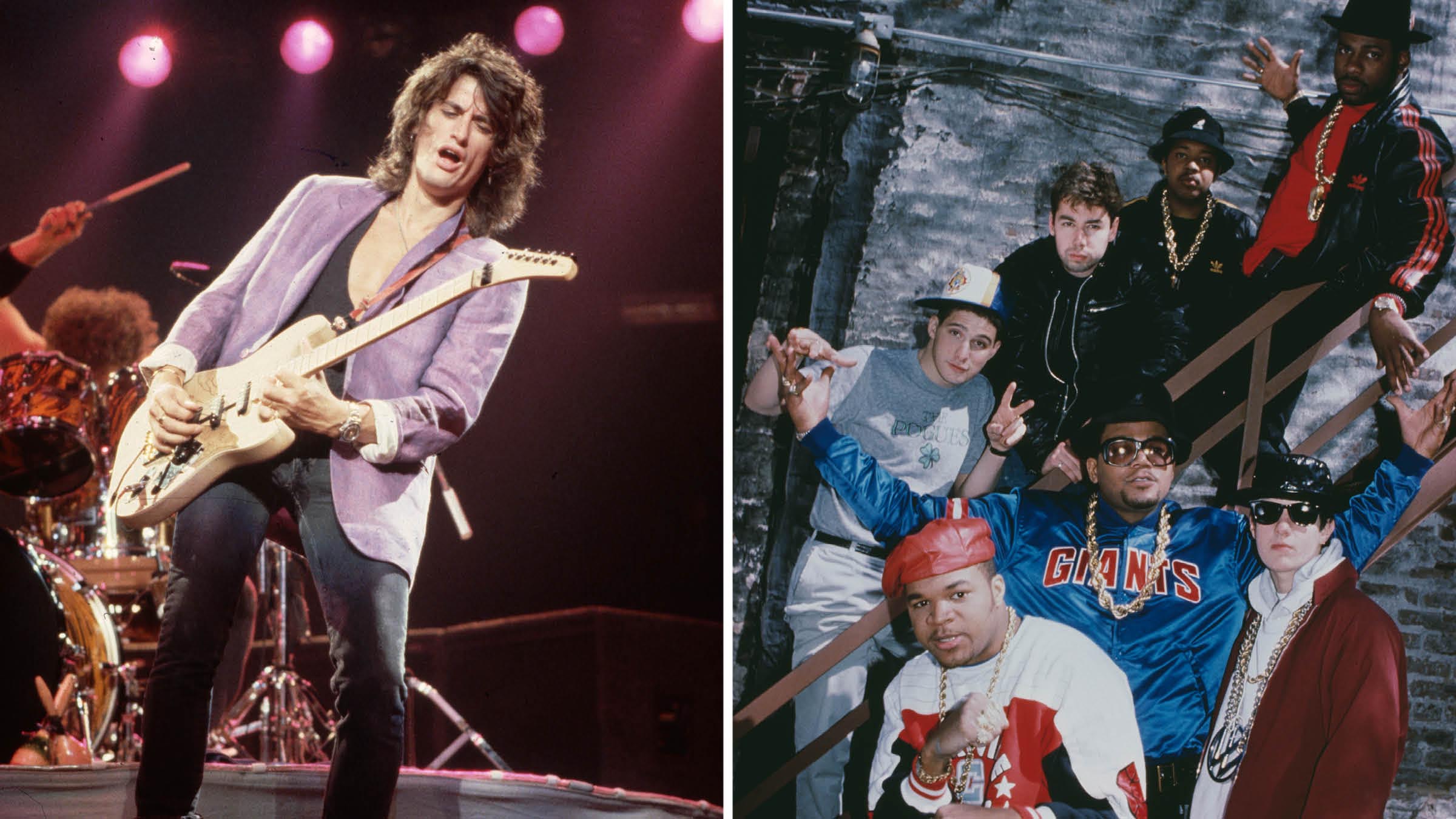Interview: '@ Home' with Thom Bresh
All the latest guitar news, interviews, lessons, reviews, deals and more, direct to your inbox!
You are now subscribed
Your newsletter sign-up was successful

“I'm a creator,” says Thom Bresh. “I love music, photography, film, voices. I’m always working.”
Bresh’s most recent project is a 14-track CD titled @ Home, which is exactly where he recorded it — “home” being Arizona, a far cry from Nashville, where he spent many years.
Bresh, as all musicians know, is the son of legendary guitarist Merle Travis, known for developing so called “Travis picking” and influencing generations of Nashville musicians. Bresh grew up in Hollywood and made his onstage debut at age 3 with a ukulele. Growing up around guitarists, his natural talent flourished, as did his showmanship. Often performing solo, sometimes with other musicians, he describes himself as an entertainer who plays guitar.
That is, of course, an understatement. Bresh is a master of the instrument, and in 2001 he was inducted into the Thumbpickers Hall of Fame. The guitar, he says, is his first love and his partner in life. He is passionate about his craft, both when playing the guitar and talking about it.
Your live setup is very clean: vocal mic, wireless, synth. What about recording?
Onstage I go direct. When I’m recording, I use a mic on my vocals if I sing, and mics on the guitars. I like the percussiveness and sound of a guitar and a direct signal off the pickup blended together. The main mics I use are a Neumann U47 and a Shure VP88 stereo condenser mic. I would like to have an RCA 77 or 44 ribbon, which are the very best for recording fingerstyle, because a ribbon mic only picks up the fundamentals of the notes being played and not the harmonics, like a condenser does. Condensers are good if you like the strumming Nashville sound, but if you’re trying to isolate fingerstyle guitar … Chet Atkins taught me.
I was trying to record a particular guitar with mics in every position, and he said, “Borrow my RCA 77. Oh, and if anything happens to it, I’ll have you killed!” Using that mic was an eye- and ear-opening experience. RCA stopped making them and even the replicas cost thousands. Pick-up the World made me a pickup that sounds like two big tube mics. They’re the best pickups I’ve ever heard for acoustic guitar.
All the latest guitar news, interviews, lessons, reviews, deals and more, direct to your inbox!
Wally Heider, the great engineer who did every live recording in the 1970s and 1980s and had a recording studio in Hollywood [Studio 3], when I was 16 I was involved in a session and I said to him, “What’s the best mic to use on a guitar?” He said, “The one you like best the way it sounds.” There is no substitution for a great mic and frequency response, but I agree with Wally.
I don't use many amps. The synth goes stereo DI, and with the guitar, even with the D’Angelico, I go into an Aphex Acoustic Xciter. Anybody playing acoustic, you’ve got to go in direct and into the system. If you’re going to walk the damn dog, get an Acoustic Xciter with four knobs. It’s the greatest thing to ever happen to acoustic guitar. You can sweep the frequency and it doesn't change the bass or treble, only the harmonics of the bottom and top end. You sweep through and find the area you want to emphasize, and bring the volume up or down along with the tone of the guitar. It’s my only outboard and it’s the most incredible piece of equipment you can own. The soundmen and I used to always hate each other. They have preconceived notions of how an acoustic guitar should sound. I want it big. We would go around and around, and now I just say, “Set everything straight and turn the volume up.”
What is your take on today's guitar players?
People buy a guitar thinking they're going to sound like whoever. It has nothing to do with it. You can buy the guitar, but that doesn't mean you're going to sound like that player, their technique, the way they attack the strings. You have consider technique, position of hands, nails or no nails. My first, second and third finger I keep my nails up. People are having acrylics put on. Tommy Emmanuel is the greatest guitarist we have at this moment in time and he uses his fingers, not his nails. James Taylor uses fingerpicks. Chet used his nails. Mark Knopfler uses no pick at all; it's bare fingers all the way through.
The guitar, the outboard gear, the pickups, the height of the strings — they all change the sound. It's very personal. I have always had a sound in my head that I wanted to sound like. People write to me and ask, "How do you get that sound onstage?" I'm thrilled that they do, because I've gone to great lengths to get that sound, and that sound, to me, is what it's all about. I'm up there with just a guitar. Bands get in the way of what I'm doing. Someone is always sick, their wife doesn't want them to leave town, it's a pain in the ass.
When did you discover that sound in your head?
I discovered it early on. I had to sound a certain way. What turned me on to Chet Atkins was the cleanliness in his articulation. He had an incredible sound. When I was 11 or 12, Travis would be setting up, playing with Johnny Cash and others at Knotts Berry Farm, and he'd call me and say, “Come set up my guitar." I would tune exactly like I heard it. Tone was important to me. Travis hit the bass strings and it sounded like an upright bass. He’d strum all those strings with the melody on top and it was the equivalent of three different tones all working together.
Acoustically, it depends on the strings and size of the box. For example, the Martin D-28 is big, and the closer you get to the mic, it gets deeper and adds more bass. Raising the mic, moving it back, you find different tonal areas and that was always important to me, even as a kid.
Guys who play lead, who play metal, who play Telecasters — they all have different tones and sounds. When I hear Pat Bergeson play, it’s gritty and musical but still pretty. Lloyd Ellis was incredible. Les Paul, Chet, Travis, Howard Roberts, Barney Kessel, Lenny Breau — the greatest guitarist ever — all of these players have influenced me. I remember the first time I heard Eric Clapton doing “Lay Down Sally” — the shuffle, the bass and drums — I love the feel of that record. I loved the rhythm section before he even sang. That rhythm section is what I do. I love Paul McCartney. I do things on guitar that McCartney did on piano.
How did you find it on the guitar?
I found it because tone and expression are what people get by rolling all their influences together and seeing what comes out, what comes natural to you, and that essence becomes your sound. It's not a matter of the guitar strings or the pickups. It's influences and your playing. Travis wouldn't show me anything. He let me set his tone and I'd watch him play. When I was in my 20s, he said, "We need to get together and go over these songs so that we can do duets; otherwise, the harmony parts won't work." He didn't want me to become a carbon copy. You have to make your own style. I hear guitarists argue about intricate things that Chet did. Who cares? Listen to it, figure it out, play it yourself and make it your own!
— Alison Richter
Alison Richter interviews artists, producers, engineers and other music industry professionals for print and online publications. Read more of her interviews right here.
Alison Richter is a seasoned journalist who interviews musicians, producers, engineers, and other industry professionals, and covers mental health issues for GuitarWorld.com. Writing credits include a wide range of publications, including GuitarWorld.com, MusicRadar.com, Bass Player, TNAG Connoisseur, Reverb, Music Industry News, Acoustic, Drummer, Guitar.com, Gearphoria, She Shreds, Guitar Girl, and Collectible Guitar.
